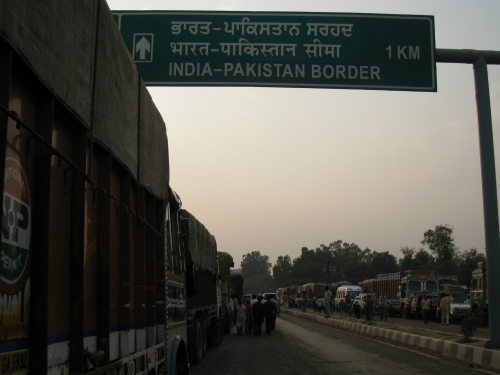"Out beyond ideas of right and wrong there is a field. I'll meet you there." -Rumi In the subcontinent, there is really only one religion that unites India, Pakistan and Bangladesh: cricket. With India’s...
KEEP READINGThe CPD Blog is intended to stimulate dialog among scholars and practitioners from around the world in the public diplomacy sphere. The opinions represented here are the authors' own and do not necessarily reflect CPD's views. For blogger guidelines, click here.
India Blog Series: The Role of Citizen Diplomacy in India-Pakistan Relations
APDS Blogger: Anna Dawson
For decades, the relationship between the governments of India and Pakistan has been characterized by mutual distrust-- pursuing a devastating arms race and fomenting one crisis after another, leaving little room for strong bilateral relations. Official diplomacy between the two governments has resulted in vague resolutions with no concrete statements. While the governments have been unable to find common ground, unofficial people-to-people dialogue has emerged between Pakistanis and Indians working to promote peace and mutual understanding where the government has not. Subsequently, citizen diplomacy has gained prominence as more citizens from both countries seem more inclined to build a peaceful future than their respective governments.
Citizen Diplomacy is the practice of an individual acting as an informal representative of his/her home country. Anyone can be a citizen diplomat-- students, teachers, businessmen and women, humanitarians, and even tourists. Often, the most lasting impressions of a country come from the personal encounters with individuals from that country. Face-to-face interactions like these facilitate mutual understanding, allowing people of different backgrounds to find common values and interests, and perhaps mitigate wrong impressions of a certain group. Citizen diplomacy can complement or be completely removed from traditional diplomacy efforts. Citizen diplomats are often ordinary people, young and old, taking part in educational exchanges, cultural exchanges, or engaging in humanitarian efforts abroad.
In the case of a decades-long conflict between India and Pakistan, citizen diplomacy has the potential to counter a negative way of thinking about each other through people to people interaction.

Different groups of citizen diplomats in India and Pakistan are reaching across the border to find mutual grounds and means for a more peaceful future. The South Asian Free Media Association is composed of progressive journalists from both countries that work to provide a balanced news source and counter ultra-nationalist media and media portrayals that demonize the other. The South Asians for Human Rights works to create regional instruments to support human rights, gender equality, justice, and strengthening regional interaction. The Pakistan-India Peoples’ Forum for Peace and Democracy is prominent among citizen groups, tackling issues such as reduction in military spending, and promoting education that is not based on hostility towards each other. The group began in 1994 with 25 people from both countries meeting in Lahore, Pakistan. Today, their conventions, held alternatively in both countries, attract hundreds of people who have a common interest in mutual understanding and progressing towards peace. This year, the joint convention will be held from December 29-31 in Allahabad, India.

Critics of this type of informal citizen diplomacy argue that the outcomes of these meetings, summits, and recommendations never find their way into actual policy-making processes in India and Pakistan. While the political decisions will ultimately be made by the two countries’ governments, the use of citizen diplomacy develops an environment conducive to positive outcomes. By having people to people interactions, some of the biases and prejudices against the other can be alleviated. When mutual distrust is prevalent between two countries, this channel of communication brings a human aspect that the government lacks.
While citizen diplomacy is an informal means of diplomacy, there are ways that both governments can support its people-to-people interaction. Easing visa restrictions, increasing public transportation between India and Pakistan, and encouraging media, musical, sports, and art exchanges are just a few ideas to help promote an environment conducive to mutual understanding. The Indian and Pakistani governments can help create a better environment for future official relations by supporting the unofficial citizen diplomacy already occurring.
While in India, I would like to research the impact that citizen diplomacy has on achieving greater mutual understanding between Indian and Pakistani people. I want to discover the direction that citizen diplomacy is heading. The questions I would like to answer are as follows: will citizen diplomacy between the countries grow on the online platforms? Will the governments recognize citizen diplomacy as a viable complement to official diplomacy? To CPD Blog readers who have experience in India-Pakistan relations, I would love to learn more about your experiences with citizen diplomacy between the countries.
Anna Dawson is a Master of Public Diplomacy candidate and a Senior Editor for USC’s Public Diplomacy Magazine. She is also participating in the India:Inside Out Project. This past summer, she interned at the Center for International Private Enterprise in Washington, DC.
Visit CPD's Online Library
Explore CPD's vast online database featuring the latest books, articles, speeches and information on international organizations dedicated to public diplomacy.
POPULAR ARTICLES
-
January 29
-
January 20
-
January 28
-
January 2
-
January 8
Join the Conversation
Interested in contributing to the CPD Blog? We welcome your posts. Read our guidelines and find out how you can submit blogs and photo essays >.













